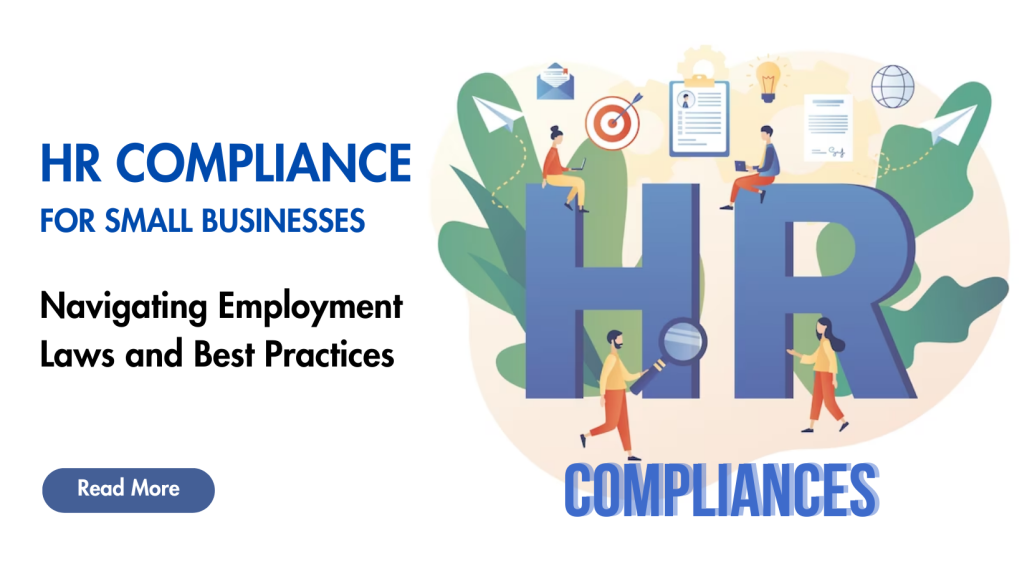
Running a small business can be both rewarding and challenging. One of the most significant challenges faced by small business owners is ensuring compliance with the ever-evolving landscape of employment laws and regulations. Failure to adhere to HR compliance requirements can lead to legal repercussions, financial penalties, and damage to the company’s reputation. Therefore, it is crucial for small businesses to be well-informed about employment laws, regulations, and best practices to create a fair, safe, and productive work environment.
1. Understanding Employment Contracts:
Employment contracts are the foundation of the employer-employee relationship. They establish the terms and conditions of employment, including job duties, compensation, benefits, working hours, and termination procedures. Small businesses should ensure that employment contracts are carefully drafted, clear, and legally sound. It is recommended to consult with legal professionals or HR experts to tailor contracts to the specific needs of the business while ensuring compliance with relevant laws.
2. Navigating Labor Laws:
Compliance with labor laws is essential to protect the rights of employees and maintain a positive workplace culture. Small business owners must be aware of the federal, state, and local labor laws that apply to their operations.
Key areas to focus on include:
- Minimum Wage: Ensure employees are paid at least the minimum wage mandated by the applicable laws. Some jurisdictions might have higher minimum wage requirements than federal laws.
- Overtime Pay: Understand overtime regulations and pay eligible employees at the appropriate rate for any hours worked beyond the standard workweek.
- Employee Classification: Properly classify workers as employees or independent contractors to comply with tax and labor laws. Misclassification can lead to legal consequences.
- Family and Medical Leave Act (FMLA): Comply with FMLA regulations by providing eligible employees with unpaid leave for certain family or medical reasons.
- Anti-Discrimination Laws: Small businesses should be well-versed in anti-discrimination laws, including those that prohibit discrimination based on race, gender, age, religion, disability, and other protected characteristics.
3. Prioritizing Workplace Safety:
Creating a safe work environment is not only a moral responsibility but also a legal requirement. OSHA (Occupational Safety and Health Administration) sets standards to ensure workplace safety. Small businesses should implement safety protocols, provide adequate training, and maintain records of safety incidents and measures taken to prevent them.
4. Record-Keeping and Documentation:
Maintaining accurate and organized records is crucial for HR compliance. Small businesses should keep records related to employment, such as:
- Employee Personal Information: Including names, addresses, social security numbers, and emergency contacts.
- Payroll Records: Documenting wages, hours worked, and tax withholdings.
- Time Off and Leave: Record vacation, sick leave, and FMLA leave.
- Performance Evaluations: Regularly assess and document employee performance.
- Disciplinary Actions and Complaints: Keep records of disciplinary actions taken and any complaints filed.
Proper record-keeping not only ensures compliance but also helps in handling employee disputes or potential legal issues.
5. Staying Updated and Seeking Expert Guidance:
HR compliance requirements are subject to change as laws and regulations evolve. Small businesses should allocate time and resources to stay updated on any changes that may affect their operations. It is advisable to seek guidance from HR professionals, legal advisors, or professional employer organizations (PEOs) specializing in HR compliance for small businesses.
6. Training and Educating Employees:
Creating a culture of compliance requires the involvement of all employees. Conduct regular training sessions to educate employees about company policies, employment laws, workplace safety, and anti-discrimination practices. Employees who are aware of their rights and responsibilities are better equipped to contribute to a compliant and harmonious work environment.
Conclusion:
HR compliance is a critical aspect of running a successful small business. By understanding and adhering to employment laws, regulations, and best practices, small business owners can build a strong foundation for their companies. Implementing proper employment contracts, navigating labor laws, prioritizing workplace safety, and maintaining comprehensive records are essential steps towards achieving HR compliance.
By investing in HR compliance, small businesses can not only mitigate legal risks but also foster a positive and productive workplace environment for their employees. Remember, seeking guidance from HR experts and legal professionals can be invaluable in ensuring your small business remains compliant with current employment laws and regulations.
Disclosure: As part of our commitment to transparency and providing valuable content, we want to inform you that some of the links on this website are affiliate links. This means that if you click on an affiliate link and make a purchase, we will earn a small commission at no additional cost to you.
We only recommend products or services that we believe will genuinely benefit our readers and that we have used or thoroughly researched ourselves. The commission earned from affiliate links helps support the maintenance and growth of this website, allowing us to continue delivering valuable information and resources.
Please note that our editorial content is not influenced by affiliate partnerships. We strive to provide unbiased and honest information to help you make informed decisions.
Thank you for your support, which enables us to keep providing high-quality content and resources to our audience. If you have any questions or concerns regarding our affiliate partnerships, feel free to contact us.

Leave a comment